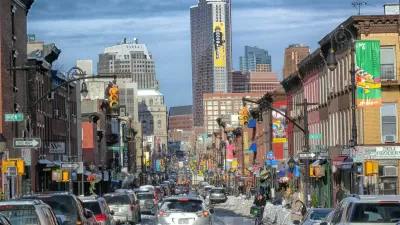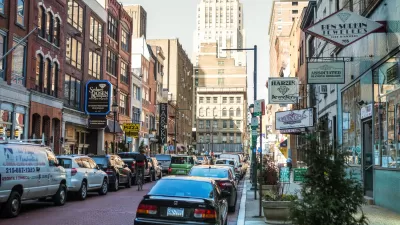Ongoing research from the University of California Transportation Center documents the detrimental effects that free street parking for the disabled has on city coffers and performance pricing systems. Is it time to reconsider such laws.
"There is no good way to ask this without sounding like a jerk, but here it is: Do disabled people really need free parking?" asks Emily Badger. "Yes, they need convenient parking spaces. But cities all over the country have oddly conflated drivers in need of close curbside access with people too poor to pay for it. The two groups are not necessarily one and the same. Worse, free parking for the disabled invites all kinds of wildly offensive misuse. As a result, the policy is arguably bad for urban parking systems, definitely bad for city coffers, even bad for the environment."
"The best evidence we've seen for this politically touchy case comes from some fascinating ongoing research out of the University of California Transportation Center, by Michael Manville and Jonathan Williams." Badger examines the findings reported in an article published by the two in ACCESS, the transportation center's magazine.
"Manville and Williams aren't arguing that we should abolish disabled parking all together. Rather, they argue that there's no good reason to make it free, and plenty of reasons not to."
FULL STORY: Seriously, We Have to Stop Giving Away Free Parking to the Disabled

Planetizen Federal Action Tracker
A weekly monitor of how Trump’s orders and actions are impacting planners and planning in America.

Congressman Proposes Bill to Rename DC Metro “Trump Train”
The Make Autorail Great Again Act would withhold federal funding to the system until the Washington Metropolitan Area Transit Authority (WMATA), rebrands as the Washington Metropolitan Authority for Greater Access (WMAGA).

The Simple Legislative Tool Transforming Vacant Downtowns
In California, Michigan and Georgia, an easy win is bringing dollars — and delight — back to city centers.

The States Losing Rural Delivery Rooms at an Alarming Pace
In some states, as few as 9% of rural hospitals still deliver babies. As a result, rising pre-term births, no adequate pre-term care and harrowing close calls are a growing reality.

The Small South Asian Republic Going all in on EVs
Thanks to one simple policy change less than five years ago, 65% of new cars in this Himalayan country are now electric.

DC Backpedals on Bike Lane Protection, Swaps Barriers for Paint
Citing aesthetic concerns, the city is removing the concrete barriers and flexposts that once separated Arizona Avenue cyclists from motor vehicles.
Urban Design for Planners 1: Software Tools
This six-course series explores essential urban design concepts using open source software and equips planners with the tools they need to participate fully in the urban design process.
Planning for Universal Design
Learn the tools for implementing Universal Design in planning regulations.
Smith Gee Studio
City of Charlotte
City of Camden Redevelopment Agency
City of Astoria
Transportation Research & Education Center (TREC) at Portland State University
US High Speed Rail Association
City of Camden Redevelopment Agency
Municipality of Princeton (NJ)





























